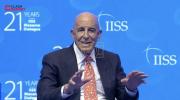טאם באראק ווארנט לבנון פארן ארבעטן מיט חיזבאללה


U.S. Envoy Tom Barrack delivered a stark assessment of Lebanon’s deteriorating state, warning that Hezbollah has effectively replaced the Lebanese government as the country’s functioning authority. Speaking before reporters and regional officials, Barrack outlined a devastating collapse of Lebanon’s public institutions — from banking and energy to education and security — and contrasted that failure with Hezbollah’s expanding reach and military dominance.
“There’s no central bank. The banking system is bust. There’s no electricity, people rely on private generators. For water and education, you need private providers. So what’s the state? The state is Hezbollah,” Barrack said, painting a vivid picture of a nation where civil governance has given way to armed control.
The envoy’s remarks underscore what many analysts have long feared: Lebanon has transitioned from a fragile democracy to a state effectively held hostage by an Iranian-backed militia. Hezbollah, he explained, now performs many of the functions once reserved for the government — distributing aid, running schools, and providing utilities — all while maintaining one of the most powerful non-state military forces in the world.
“In the south, Hezbollah provides water, education. It has 40,000 soldiers; the LAF has 60,000,” Barrack continued. “But Hezbollah soldiers make $2,200 a month, LAF soldiers $275. Hezbollah has 15–20,000 rockets and missiles; LAF soldiers have old jeeps and AK-47s.”
His comments highlight the deep imbalance that now defines Lebanon’s internal structure: an impoverished, under-equipped national army facing a well-funded, Iranian-armed militant organization operating freely within its borders. The Lebanese Armed Forces (LAF), once regarded as a symbol of national unity, has seen its credibility collapse alongside the economy. Meanwhile, Hezbollah’s parallel governance network has become the de facto authority in vast regions of the country — particularly in the south and parts of Beirut’s suburbs.
U.S. officials have expressed growing concern that Hezbollah’s dominance poses a direct threat not only to Israel’s northern frontier but to regional stability more broadly. Under President Trump’s foreign policy framework, Washington has tightened sanctions on Hezbollah’s financiers and expanded intelligence cooperation with Israel to monitor Iranian-linked arms transfers through Syria and Lebanon.
“Lebanon’s tragedy is that its people are being ruled by a militia loyal to Tehran, not by a government accountable to its citizens,” one senior administration official said following Barrack’s remarks. “Hezbollah’s control is not governance — it’s occupation by proxy.”
Barrack’s candid assessment reflects a broader frustration within U.S. and allied circles over the international community’s failure to prevent Lebanon’s collapse. Despite billions in Western aid over the past decade, rampant corruption and Hezbollah’s infiltration of political institutions have left the country in economic and moral ruin.
For the Trump Administration and its allies in Jerusalem, the warning is clear: a failed Lebanon under Hezbollah control is not just a humanitarian disaster — it’s a security threat that extends far beyond its borders.
גאלערי
ווידעאס